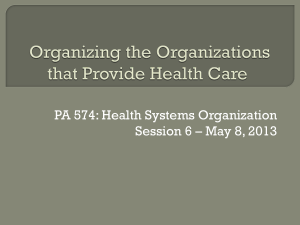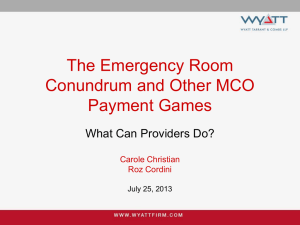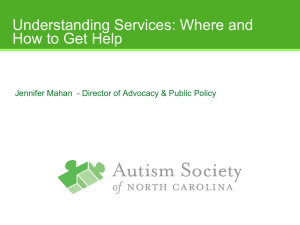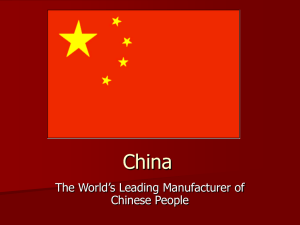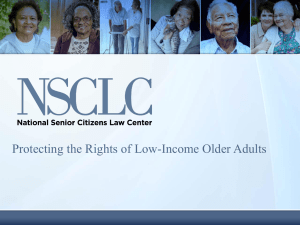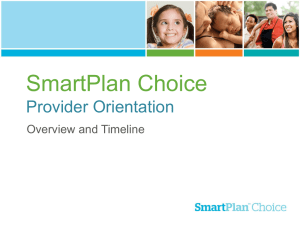Managed Care Organizations Updates for AAAs
advertisement
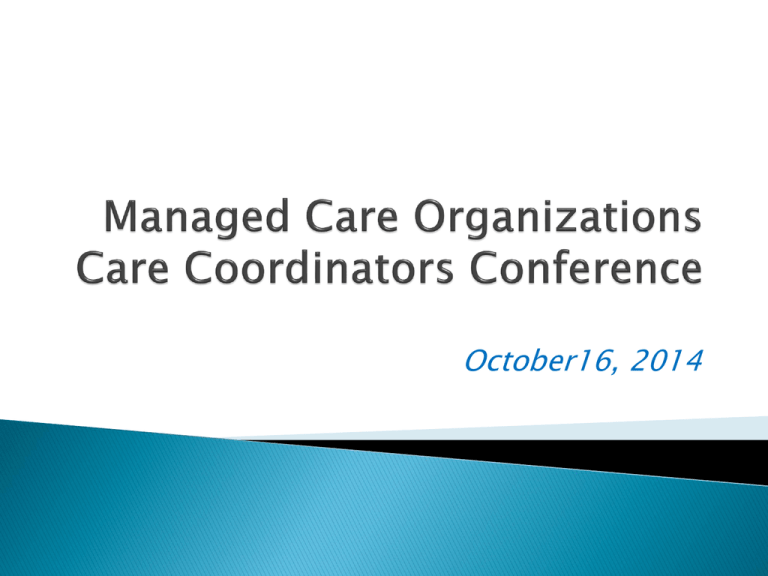
October16, 2014
The
Medicaid reform law [PA 961501], requires that by January 1,
2015, at least 50 percent of the
individuals covered under
Medicaid be enrolled in a care
coordination program that
organized care around their
medical needs.
To
meet this goal, the Department
of Healthcare and Family Services
(HFS), in collaboration with the
Departments on Aging (IDoA) and
Human Services (DHS), will move
eligible older adults and persons
with disabilities to risk-based
managed care programs.
Integrated Care Program (ICP)
Medicare-Medicaid Alignment Initiative
(MMAI) “Duals”
Family Health Plan (FHP) (Families with Kids &
ACA adults)
Coordinated Care Entities (CCEs) (Seniors and
Persons with Disabilities) – Not MCOs
HFS introduced the first Integrated Care
Program (ICP) on May 1, 2011(for Medical
services)
The Program is for older adults and persons
with disabilities
Enrollees in ICP must be eligible for Medicaid,
but not eligible for Medicare
ICP brings together healthcare for
participants through
◦
◦
◦
◦
◦
Local primary care providers
Specialists
Hospitals
Nursing homes
Home & Community based service providers
ICP participants receive the same health
services that are available through Medicaid
Enrolled in Medicaid but NOT enrolled in
Medicare.
Members have a choice of health plans and
PCPs.
Receive better coordination of care, manage
their own healthcare needs, and receive
additional programs & services to help them
live healthy independent lives.
ICP is made up of two Service Packages –
Service Package I and II.
Service Package I includes medical &
Behavioral health services
Service Package II expands services to include
long-term services & supports (LTSS),
including nursing home care and Home &
Community Based waiver Services (ie, CCP
services including case management, INH,
ADS, and EHRS)
The first phase of ICP2 implementation
started in February of 2013 in Suburban
Cook.
Throughout 2013, ICP2 expanded into
additional regions throughout the state.
The final phase of the ICP2 implementation
included the City of Chicago in February 2014
Approximately 3,000 CCP participants have
been transferred from CCP to MCO due to the
ICP initiative.
Cook County
Dupage, Kane, Kankakee, Lake & Will
Rockford Region: Boone, McHenry, Winnebago
Central Illinois Region:
Knox, Peoria, Stark, Tazewell
McLean, Logan, DeWitt, Sangamon, Macon, Christian,
Menard, Piatt, Champaign, Ford, Vermilion
Quad Cities Region: Rock Island & Mercer
Metro East Region: Madison, Clinton & St. Clair
Impacts those who are dually eligible
for Medicaid & Medicare
Provides both medical, behavioral, long
term care and home and community
based services.
Starts with all services being provided
at initial implementation
Members have a choice of health plans and
PCPs.
Receive better coordination of care, manage
their own healthcare needs, and receive
additional programs & services to help them
live healthy independent lives.
Operates in Greater Chicago and Central
Illinois regions
Anticipated to provide services to an
estimated 135,000 Seniors and Persons with
Disabilities
HFS estimates that approximately 22,000
persons will be transferred from CCP to MMAI
by February 2015
Six managed care organizations serve MMAI
clients in the Greater Chicago area.
Two managed care organizations serve
clients in Central Illinois.
1st batch of letters for LTSS clients were
mailed on September 22, 2014
HFS sends out a series of 3 letters announcing
enrollment in managed care programs
ICP auto enrolls clients at the end of the 3 letter
process
MMAI auto enrolls clients at the beginning of the 3
letter process
The MMAI process leads to multiple changes in MCOs
prior to the enrollment date.
ICP – Mandatory enrollment; MMAI – Can Opt out
There should be no interruption in the
delivery of services to the participant
The MCOs are required to keep all current
service plans in effect for a minimum of 180
days (but can alter service plan with
permission of participant sooner)
MCOs are required to provide all waiver services
to participants
MCOs have contracted with CCP providers of inhome, adult day and emergency home response
services
The plans are required to utilize only IDoA
certified CCP providers for CCP services
MCOs will pay, at a minimum, current hourly
rates to these CCP providers
MCOs are not mandated to pay for non-waiver
services. (i.e. Older Americans Act Services such
as home delivered meals, congregate meals or
Respite or Money Management services)
MCOs do have the responsibility to make
appropriate referrals to providers of nonwaivered services as needed by the participant
MCOs will have discretion to pay for non-waiver
and non-Medicaid services that are needed by
the participant
The CCUs remain responsible for determining
a participant’s initial and annual eligibility for
services (Determination of Eligibility {DOE})
The MCO are responsible for administering
the care assessment and care planning
functions including all Case Management
monitoring tasks
MCOs are responsible for all service
complaints from clients
Providers should notify the MCO case
managers when changes occur with the client
(ie, hospitalizations, refusal of services, etc)
The MCO serves as the case manager for all
client needs.
Clients should be encouraged to contact the
MCO with issues not the CCU.
Initial DOE – send MCO Status form
Annual DOE – send MCO Status form
Notify providers when clients transfer to
MCOs – send Provider Notification Form
Enter a 10/12 no bill CAT to synch
CMIS/eCCPIS
Complete Prescreens
Score the DON accurately
Provide CM on all clients until their actual
enrollment date begins
DO terminate services when a client transfers
to MCO & DO authorize the MCO contract
DON’T terminate the client entirely from CCP
DO encourage clients to call their enrollment
broker for MCO decisions 1-877-912-8880
DON’T give the BEAM 855 # to clients
DON’T decrease DON scores because a client
has MCO services in place
DON’T stop HDMs and other Title III services
DO continue to communicate effectively
DON’T accept referrals/rede requests directly
from the MCOs
CATS must be entered correctly
CATs must be entered in a timely manner
When a client terminates CCP services a
termination CAT terming all services must be
entered
If CCUs completed the 40/061CAT to transfer
a client to an MCO (old policy) but didn’t
enter the 01/000 to authorize the MCO they
must complete that 01/000 immediately.
Make sure you are manually changing the
“next assessment dates”
Indicator codes identifying which waiver a
person is enrolled are added to all open
cases.
Indicator codes are removed when
termination CATs are submitted.
These indicator codes are what HFS uses to
notify MCOs that a client is part of the waiver
and should be receiving waiver services.
The State doesn’t collect federal
reimbursement for Medicaid clients.
MCOs will not know to provide case
management services to the clients
MCOs will not authorize services or pay the
providers for servicing CCP clients.
Clients that have not been terminated in
eCCPIS will continue to look like CCP clients
(budget issues/confusion to clients)
Complete assessments & establish care plans
Monitor clients & provide CM for all areas
Assist with completion of benefit applications
Complete the MCO Participant transfer form on
all clients returning to CCP (only CCP clients)
Responsible for CM until date of disenrollment –
including starting new services
Make referrals to appropriate Title III and other
non-waiver services (provide all required
information/assessments)
Send service authorizations to providers ASAP
Communicate with providers
Make referrals to BEAM for new clients
If a client transfers to a new MCO – provide all paperwork
to the new MCO & notify providers
If a client requests an increase in services – you DO NOT
need to request a new DON to be completed (even if it
exceeds the SCM)
Only request a reassessment if you think that the client is
no longer eligible for services (improved, needs 24 NH
care)
If a client’s services will be terminated the MCO must
follow IDOA rules and send a letter certified mail and allow
15 days to change their mind, then notify BEAM to cancel
services.
MCOs should not be contacting CCUs directly with
referrals or requests for reassessments
MCO members can appeal any action just like
CCP members.
All appeals related to services (including
service levels) should be sent to the MCO
IDOA only does appeals on eligibility (29
DON)
HFS is final decision in appeal hearings
Transferring Current CCP participants to MCOs
(Revised 8/1/14)
MCO enrollee requiring waiver services
New referrals for services
Non-waiver services for MCO participants
Demo policies
◦ IVMMP
◦ SCP
◦ Cash & Counseling
Transitioning MCO participants to a CCU for
services
Colbert Policy
CCE policy
MCO Status Form (IL-402-1150)
Provider Notification of MCO transfer
MCO Participant Transfer form (IL-402-1151)
MCO participants may still receive:
Illinois Volunteer Money Management
Services
Senior Companion Services
CCUs must authorize IVMMP & SCP services on
the CAT when they authorize the MCO service
Participants enrolled in the MCO program
cannot also receive C&C or MCCP
demonstration services.
If the participant receives C&C or MCCP
services they will need to be transferred to
traditional CCP services prior to being
transferred to the MCO.
Disenrollment from an MCO can happen for a number
of reasons.
◦ In ICP, may become eligible for Medicare (turn 65 years of
age)
◦ No longer eligible for Medicaid
◦ Move out of MCO territory
◦ In MMAI, may opt out of MCO services
Disenrollments only occur on the last day of the
month
The participant will be transferred to the CCU and the
CCU will then be responsible for providing case
management services and authorizing CCP services
as needed
MCOs will be making referrals to AAAs, HDM
providers, Respite providers, local service
providers, etc. for services.
Providers, MCOs & CCUs will need to work
together to provide care to the clients.
MCOs are a new partner in the network and
communication will be key to making this a
successful implementation.
BEAM
Benefits, Eligibility, Assistance &
Monitoring
Weekly extract file from HFS
Notify CCUs of transfers to MCOs, changes in
vendors, transfers back to CCP
Assist CCUs, providers and MCOs obtain
required paperwork and information
Investigate & resolve issues on MCO cases
Monitor quality assurance during the process
Coordinate with HFS on policy and
procedures for implementing additional
Managed Care initiatives
Eliminates the need for CATs when transferring
CCP clients between CCP and MCOs.
Allows IDOA to indicate which members are in
MCO or CCP
Stops CCUs from entering CATs into the wrong
program types
Stops CCP providers from billing IDOA when a
client is in an MCO
Notifies providers of which MCO a member is
enrolled with when unauthorized billing occurs
EDD is determines if the CAT gets through
Prescreens that reject as a A295 (clt in MCO)
should be regenerated as a program type 15
If you are getting rejects and you have
checked MCO status with BEAM then contact
Aging Advisor to have the filter verified.
1-855-228-6516
Aging.Advisor@Illinois.gov

